
Importance
Businesses faced heightened expectations regarding human rights, particularly through global developments in laws and standards. These included developments regarding the adoption of the European Union Corporate Sustainability Due Diligence Directive (CSDDD) (Link: https://europetouch.mfa.go.th/th/content/), which mandates businesses operating in the European Union to assess the social and human rights impacts throughout their supply chains, and internal developments within Thailand, with the launch of the 2nd National Action Plan on Business and Human Rights in the middle of 2023.
OR recognizes that the activities of business and suppliers may impact the lives of various groups of individuals. These range from the labor rights of employees, the living standards of communities in the operational areas, to the privacy rights of consumers. As a business with diverse operations across multiple countries, including business activities with customers in the European Union, OR must comprehensively address human rights issues to ensure compliance with relevant laws and avoid negative impacts on the human rights of our stakeholders.
In addition, OR actively promote human rights, and are committed to conducting business in accordance with human rights principles, in line with applicable laws, regulations, and international standards. OR consistently ensure that all employees are entitled to equal treatment, with the right to express their opinions and avenues complaint channels in case of any improper treatment.
2024 Targets
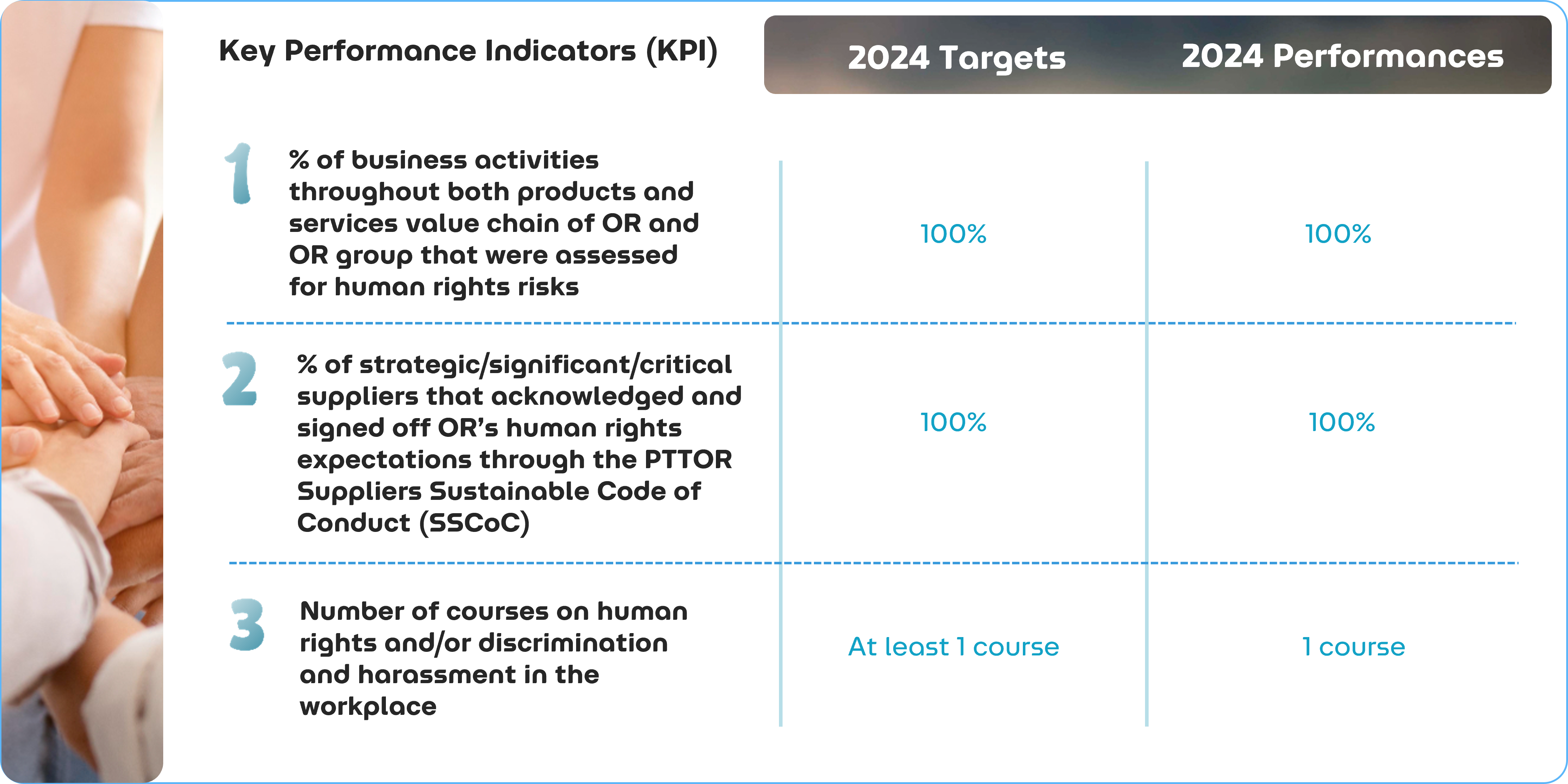
Management Approach
Human Rights Policy
OR is committed to conducting business with integrity and respect for human rights. In 2022, OR has announced a Human Rights Policy expressing our commitment to act in accordance with the principles of international human rights, international laws, and local laws of the country where OR conducts business. The Policy is aligned with accepted international human rights standards and practices, such as the United Nations Universal Declaration of Human Rights (UNHDR) and the Core Conventions of the International Labor Organization (ILO Core Conventions). OR is committed to promoting equality and prohibiting discrimination on the basis of gender, ethnicity, race, religion, or any other status. We uphold employees’ labor rights and strongly oppose the use of child labor and forced labor. The scope of the Policy covers all OR’s business operations, including OR group and business partners that is contractors, suppliers, agents and service providers, as well as any new business relations or joint ventures with diverse forms of business relationships.
Read more on the Policy
OR communicates the Human Rights Policy to employees and stakeholders by integrating the Policy into training programs for new employees and new dealers. The contents of the Policy are passed on to OR group through the OR Group Way of Conduct, and to suppliers and contractors through the PTTOR Suppliers Sustainable Code of Conduct (SSCoC). In 2023, OR also published the ‘OR Group Human Rights Handbook‘, which defines work processes and standards that support compliance with the Human Rights Policy of OR and OR subsidiaries.
OR has assigned responsibility for oversight of human rights issues to the Sustainability, Quality, Safety, Health and Environment Department. Responsibilities include conducting human rights due diligence (HRDD) and human rights risk assessment at least every 3 years, monitoring human rights and reporting on the results, determining corrective actions and remediation for incidents of human rights violations, organizing training on human rights, and communicating with other relevant departments to cooperate on human rights management. The results are expected to ensure that all human rights working processes have been operated efficiently and achieve the goals.
Labor Practices
OR takes responsibility for respecting the rights of employees and workers throughout the supply chain, therefore, has established operations in accordance with international labor rights principles. The details are presented below:
Freedom of Association(GRI 407-1)
OR respects employees’ right to form associations and/or participate in collective bargaining to negotiate their working conditions and environment. OR seeks to support employees and workers in accessing this right by refraining from interfering in employee participation or membership of associations or groups. OR has also supported the establishment of welfare committees in all operational sites. These committees are groups of employees elected to represent employee interests in collective bargaining about working conditions that affect employees. Furthermore, to support access to this right for workers in our supply chain, OR has also included specific clauses on freedom of association, and the freedom of employees and workers to either participate or abstain in associations, unions, and federations, in the “OR Supplier Sustainable Code of Conduct (SSCoC)”. This information is communicated to all suppliers for their acknowledgement and strict compliance. As of 2024, OR and our suppliers do not have any risks with regards to freedom of association and collective bargaining.
Child Labor and Forced Labor(GRI 408-1, GRI 409-1)
The use of child labor and/or forced labor is a grave violation of human rights. OR takes serious action to ensure that all OR’s businesses throughout the value chain are free from child labor and forced labor. OR is committed to compliance with laws, regulations, and international standards. Combatting and eliminating child labor and forced labor is embedded in our Human Rights Policy and the OR Suppliers Sustainable Code of Conduct (SSCoC). To that end, we have maintained child labor and forced labor as one of the human rights issues that must be closely monitored through human rights due diligence. In 2024, OR and suppliers did not have child labor and forced labor risks.
In addition, labor rights issues have been identified as one of the key focus areas, with principles, considerations, performance indicators, and practical guidelines set in the OR Group Sustainability Management Standard
(Read more about supplier standard from ‘Supply Chain Management’)
Human Rights Due Diligence (GRI 406-1., GRI 411-1)
OR prioritizes human rights management and conducts the Human Rights Due Diligence (HRDD) assessments at least once every three years in accordance with standard reporting frameworks. The latest assessment, completed in 2023, covered 100% of OR’s business operations, including contractors, Tier I suppliers, and joint ventures. This process involved representatives from responsible departments engaging with Rights Holders to review activities across the value chain and to evaluate the severity and likelihood of potential human rights risks associated with the aforementioned business activities.
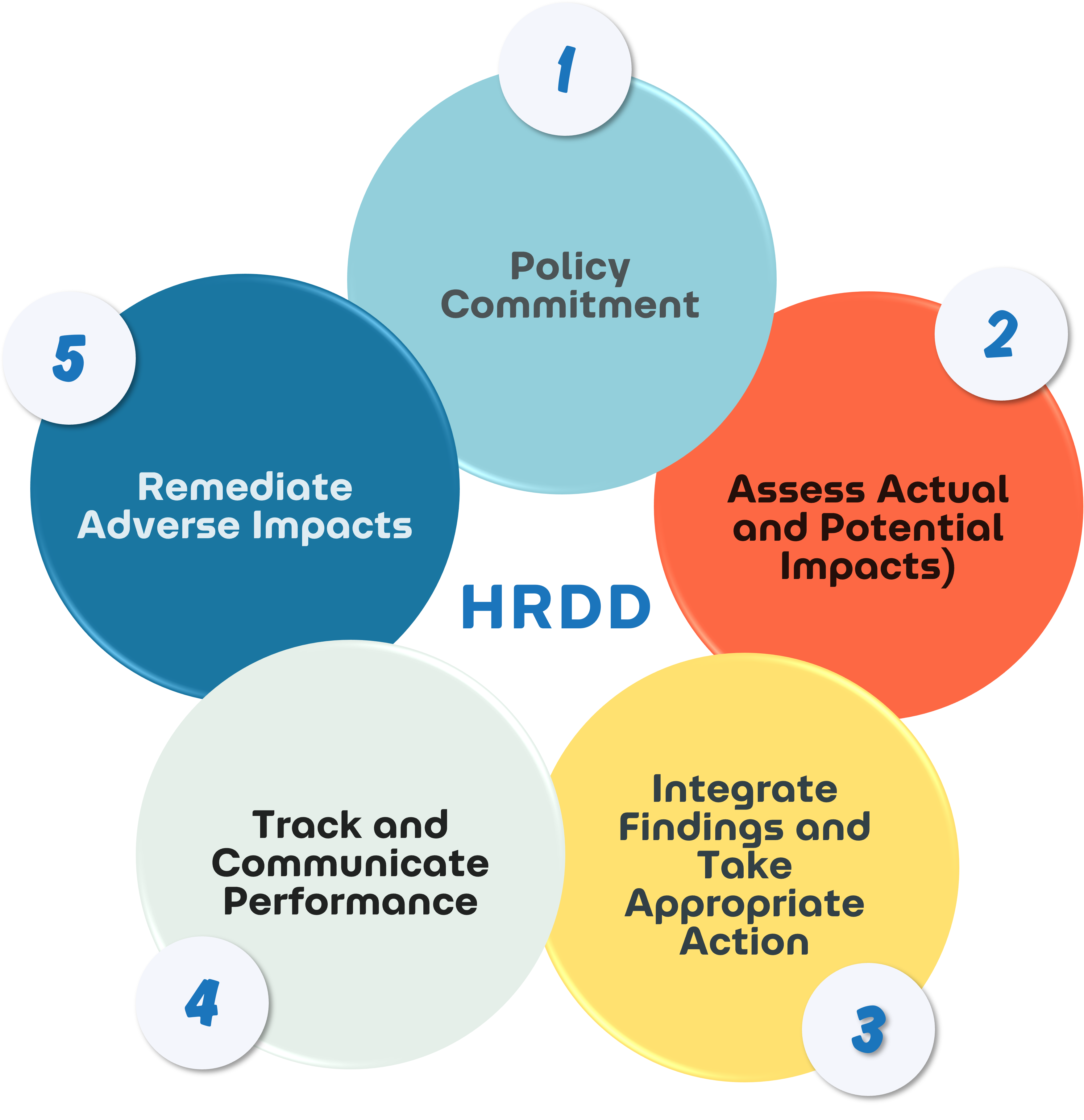
Human Rights Due Diligence Process
OR has established a human rights due diligence process including the following components:
- Establish Policy Commitment: OR has established a Human Rights Policy that covers all OR’s business operations (business activities, products, and services), OR’s subsidiaries, and joint ventures with business involving mergers and joint ventures.
- Assess Actual and Potential Impacts: OR identifies and assesses human rights risks and impacts through the value chain and associated with production of products and services of OR, Or group, and joint ventures with business relationships (OR companies from mergers and joint ventures). OR also identify stakeholders whose human rights may be affected.
- Integrate Findings and Take Appropriate Action: OR integrates findings through defining mitigation and remediation measures for human rights salient issues in order to effectively prevent and minimize human rights risks and impacts.
- Track and Communicate Performance: The department responsible for overseeing human rights will track and monitor the implementation and effectiveness of measures designed to prevent and mitigate human rights impacts. This process assesses whether the measures effectively prevent or minimize human rights risks or identify areas for improvement. The results will be reported to management and related departments for acknowledgment.
- Remediate Adverse Impacts: OR recognizes that human rights violations may affect the Company’s stakeholders. This may occur anywhere through the value chain and activities associated with the production of the products and services of OR and OR group. Thus, OR has put in place procedures to ensure access to remediation, including the establishment of complaint channels and identification of forms of compensation. Compensation may take the form of monetary compensation such as compensation for damages, as well as non-monetary forms, such as the creation of a Customer Relations Centre via telephone or website channels to take feedback, provide advice, enact corrective actions, and provide preliminary remediation to maintain the relationships between OR and all OR’s stakeholders.
Human Rights Issues and Relevant Rights Holders
OR reviews global human rights trends and updates from various sources, such as reports by Human Rights Watch and the Business and Human Rights Resource Center. Combined with findings on human rights issues identified among industry peers, OR has identified 4 salient human rights issues related to relevant rights holders: employees, suppliers and contractors, communities, and consumers and customers. The details are as follows:
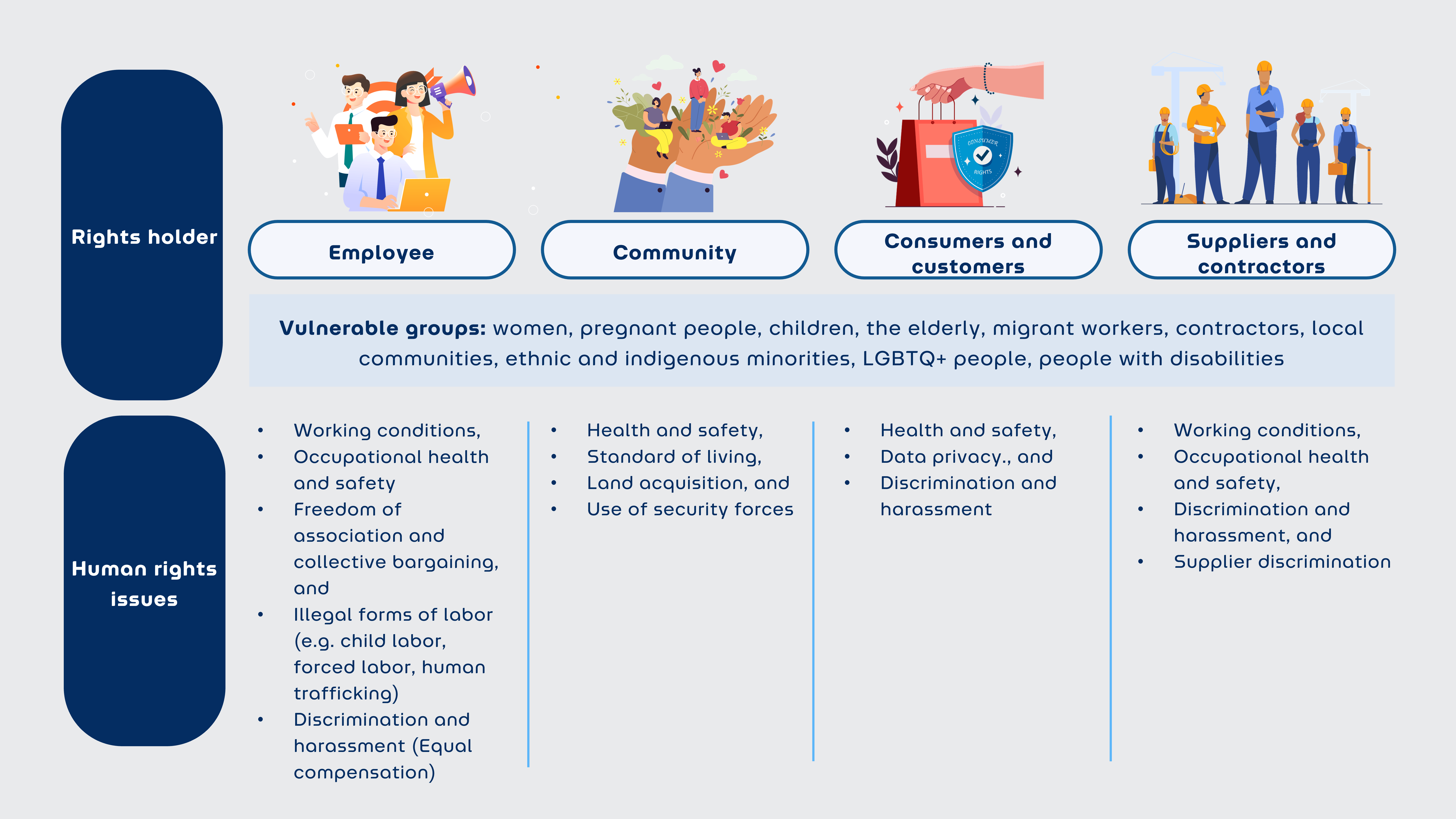
Human Rights Risk Assessment Criteria
OR evaluates human rights risks based on inherent risks, considering global trends in human rights and the practices of companies with similar business operations (peers). Assessment criteria are established by categorizing risks into two dimensions: the level of impact and the likelihood of occurrence. The details are as follows:

Meaning of risk




1) Severity of risk or impact is determined by Scale, Scope, and Irremediability
- Scale refers to the gravity or seriousness of the risk and impact such as violations to the right to live or safety of employees, customers, and communities.
- Scope refers to the number of individuals affected by the risk such as impact to the livelihoods of an entire community or the impact on the collective bargaining rights of all employees.
- Remediability refers to the feasibility or difficulty of restoring affected individuals to their original state before the violation occurred. For example, employees who suffer from depression due to verbal abuse during performance evaluations, which affects their mental health, may require more time and support to recover compared to individuals who are not affected.
The severity level is related to the risk or impact on human rights that occurs without considering the aggregate value (focusing on the worst-case scenario).
2) Likelihood refers to the likelihood of a risk or impact occurring, which depends on the context or environment in which the risk or impact takes place. The risk level for certain issues may be higher in operational areas, and it can be divided into the frequency of past occurrences and/or the probability of occurrence
Human Rights Risk Assessment Results and Mitigation Measures
From the Human Rights Due-Diligence assessment, which covers 100% of the operational areas, including contractors, Tier 1 suppliers, and joint ventures, it was found that from 2023 to 2024, OR had three salient human rights issues. These salient issues are present in 30% of OR’s own operations, 0% for contractors and Tier 1 suppliers, and 37.5% of joint ventures. Additionally, risk mitigation measures were implemented in all areas where risks were identified (100% of risk with mitigation actions taken), covering a total of 262 locations as follows:
Salient Human Rights Issue | มาตรการควบคุมความเสี่ยงและลดผลกระทบ (Process implemented to mitigate human rights risks) |
Rights Holder: Suppliers and Contractors Human rights issues: Occupational health and safety, such as the availability of personal protective equipment (PPE), work-related injuries. and accidents such as electric shock, and working at heights Related business activities: Construction for the beverage business (1 operational area) |
|
Rights Holder: Suppliers and Contractors Human rights issues: Discrimination and harassment, such as unfair hiring practices, verbal or physical harassment by supervisors or between co-workers, and threats of violence Related business activities: Food (106 operating areas) |
|
Rights Holder: Communities Human rights issues: Living standards, especially the risks Related to causing community disturbances such as from malodor, noise pollution, toxic pollution, and traffic Related business activities: PTT Station (155 operating areas)) |
|
As part of the human rights due diligence, OR incorporates evaluations of the opportunities and risks associated with launching or expanding new businesses (New Business Relations) and covering into the joint ventures, to prevent any adverse human rights impacts on either rights holders or any vulnerable groups.
Read more information in Human Rights Due-Diligence Summary Report
Complaint Channel
Communication channels and complaint mechanisms are crucial tools that allow OR to be aware of risks of human rights violations, ongoing incidents, and past occurrences. They are essential components in validating the results of human rights risk assessments. In cases where the assessment reveals incomplete risk issues, the complaint channel may serve as a pathway for rights holders to submit complaints and point out issues that may have been overlooked. OR has established communication channels and a system for receiving complaints regarding various human rights issues as follows:
1) Employees or internal rights holders can directly submit complaints through the following channels:
- Leadership and Talent Management Department – Oversees compliance with regulations and investigates complaints received through submission to supervisors or through complaint letters to the department.
- Welfare Committee, Human Resources Service Department – Receives suggestions for the development of employee welfare.
- Corporate Governance Department – Receive complaints and investigate corruption in the organization and good governance.
2) OR Customers or external rights holders
External individuals can directly submit complaints related to human rights through the OR Contact Center at 1365 available every day, from 6.00 a.m. to 10.00 p.m., social media platforms, non-anonymously and anonymously, and website: https://www.pttor.com/th/contact_center
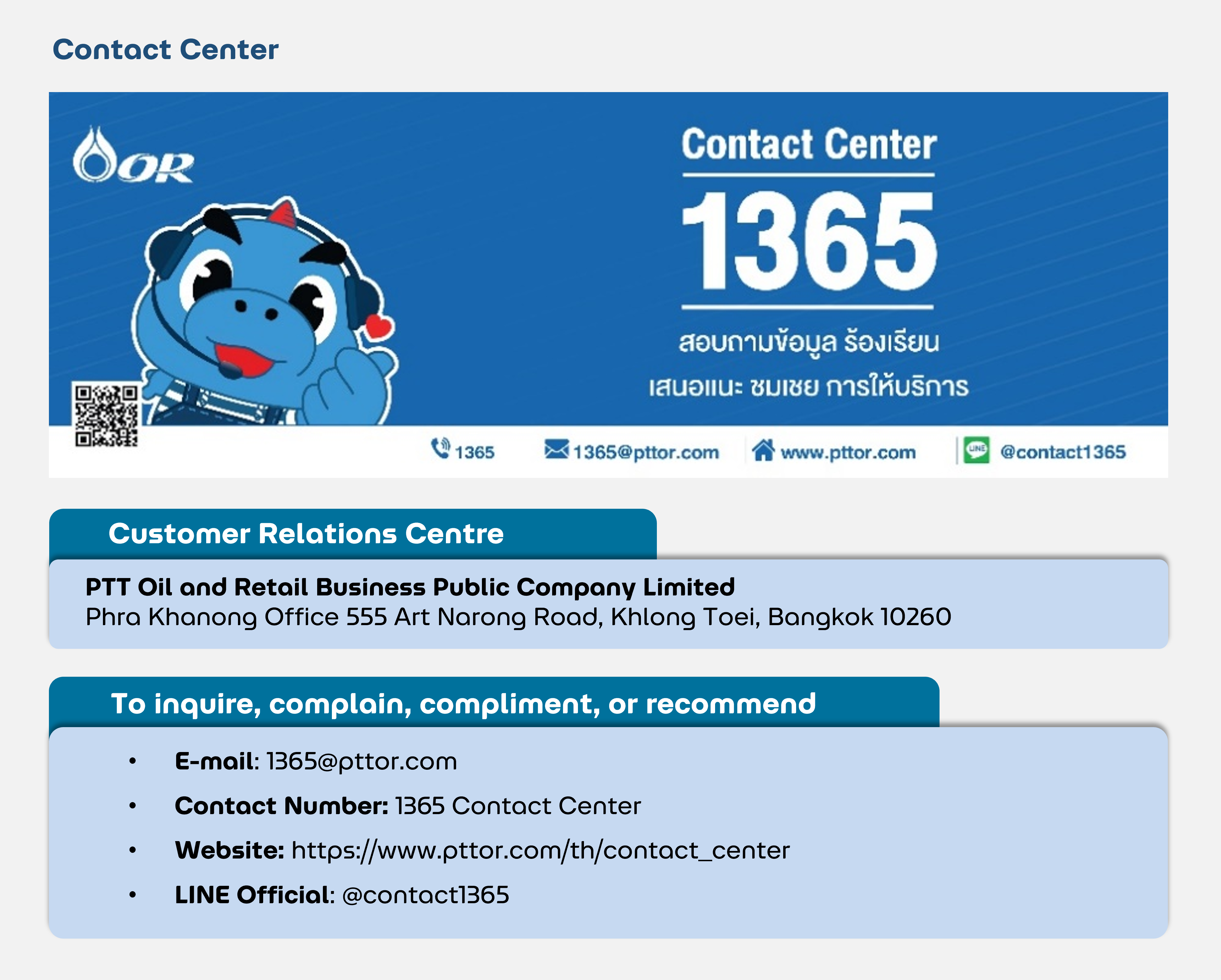
To ensure the protection of complainants, complaints will be treated confidentially, with information shared only with the relevant department. Individuals who do not wish to disclose their personal information to the relevant departments for problem resolution can notify OR, and OR will anonymize the complainant’s identity to protect them from retaliation or any unfair treatment resulting from the complaint.
OR will adhere to good corporate governance principles by committing to listen to every complaint consistently, transparently, and empathetically, ensuring fairness to all parties involved. A timeframe will be set for investigating complaints, and improvement guidelines will be communicated to complainants appropriately.
Furthermore, OR values the integration of customer feedback and stakeholder input into the complaint-handling process. Surveys will be conducted to measure satisfaction levels after complaints have been addressed to customers and rights holders, which will be used to enhance the complaint-handling process and further develop services.
OR has announced ‘Rules on Complaints and Whistleblowing against Fraud and Non-Compliance with Laws or Organizational Regulations’. The aim is to establish clear, transparent, fair, accountable, and responsible to all stakeholder guidelines and practices for whistleblowing, in line with the principles of good corporate governance and OR’s philosophy. These regulation ensures an appropriate timeframe for investigations. The whistleblower’s identity will be kept confidential, and they will be protected from retaliation both during and after the investigation. OR’s Corporate Governance Department will monitor the progress of corruption and non-compliance investigations and report to the Chief Executive Officer and the Corporate Governance and Sustainability Committee at least twice a year. Additionally, reports will be submitted to the Audit Committee at least once a year.
For further details on the corporate regulations regarding complaints, whistleblowing on corruption, and non-compliance with laws and regulations, applicable to both employees and external parties—please visit: https://www.pttor.com/wp-content/uploads/2024/10/20240125_132040_1261.pdf.
OR's Investment in Myanmar: Commitment to Human Rights and Responsible Business Practices
OR entered into a joint venture with Brighter Energy Company Limited (BE) in 2019, with the aim of engaging in the wholesale trade and storage of petroleum products. The business operations commenced while Myanmar was still in a stable situation. This investment was intended to promote and enhance the quality of life for the people of Myanmar. However, in 2021, Myanmar experienced violence and unrest, along with sanctions imposed by several countries. OR recognized the severity of the situation following the 2021 coup and closely monitored developments in order to improve decision-making processes and investment management
As OR conducts business in accordance with international human rights principles, OR expressed intention, as a shareholder, for BE to suspend the construction of the storage facility. Additionally, OR has suspended any further capital increases in the project since October 2022 to avoid involvement in or support of activities that could lead to violence or human rights violations. However, since OR is a minority shareholder with only a 35% stake, OR does not have the authority to control BE’s decision-making. The majority shareholders decided to proceed with the project until completion as originally planned. Nevertheless, OR continues to adhere strictly to guidelines and policies, ensuring that OR remains uninvolved in supporting violence or human rights violations resulting from BE’s operations in Myanmar.
OR has established a proactive risk management approach in relevant areas, including enhancing mechanisms for evaluating companies for potential investment through sustainability (ESG) assessments. This covers human rights considerations as part of the investment process. The governance of companies within the OR group extends to joint ventures, in accordance with the OR Group Way of Conduct (WoC). Additionally, OR oversees its suppliers through the OR Suppliers Sustainable Code of Conduct (OR SSCoC). Furthermore, OR has established accessible channels for stakeholders to submit complaints
Furthermore, to emphasize OR’s unwavering commitment to considering stakeholders and responsibility to society, corporate governance, and sustainable growth, OR has implemented the following actions:
- Reviewed the Compliance Policy to ensure operations adhere to laws, regulations, and include measures for trade and economic sanctions.
- Improved the Compliance Framework to respect the principles of trade and economic sanctions measures, requiring third parties acting on behalf of OR to comply as well.
- Issued a Third-Party Screening Manual for trade and economic sanctions, establishing a process to screen and verify the status of third parties before conducting international transactions using World Check Screening tools and Due Diligence questionnaires
In this regard, OR reaffirms commitment to conducting business sustainably, with a focus on respecting and protecting human rights within OR’s supply chain. OR will continue to support and promote human rights in collaboration with relevant agencies and stakeholders
To further study the details regarding OR’s stance on not supporting human rights violations in operations in the Republic of the Union of Myanmar, investors and shareholders can refer to the disclosure document on the Clarification of Investment News in Myanmar, submitted to the President of the Stock Exchange of Thailand on December 22, 2022 (click for more details) and the Management Discussion and Analysis for Q2/2023 (click for more details)
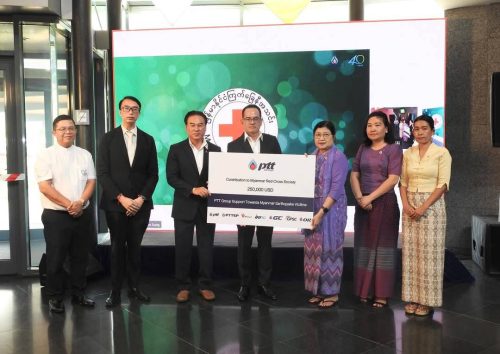
Performance
Human Rights Complaint Incident in 2024
In 2024, from all OR complaint channels, it was found that no incidents of human rights violations were reported.
OR Human Rights Awareness Training for employees and other relevant stakeholders of OR
1) Raising Awareness and Disseminating Human Rights Information to Employees through PR Media
To build a human rights-conscious organization and encourage employees to recognize the importance of human rights, prevention, and risk mitigation, as well as stay informed about human rights changes and trends both domestically and internationally, OR has developed PR materials to educate employees via email. Additionally, employees in operational areas are educated through printed materials that are regularly displayed on notice boards. To assess the effectiveness of the PR media, OR organizes quiz activities to test understanding and foster participation, allowing employees to suggest improvements to the media formats, ensuring they better meet employees’ needs.
For external stakeholders, OR has created PR materials to educate the general public through the OR Academy Facebook page and organized activities that foster engagement between OR, suppliers, contractors, and communities through human rights education, as part of the 2024 OR Safety Day event held on 30 July 2024.
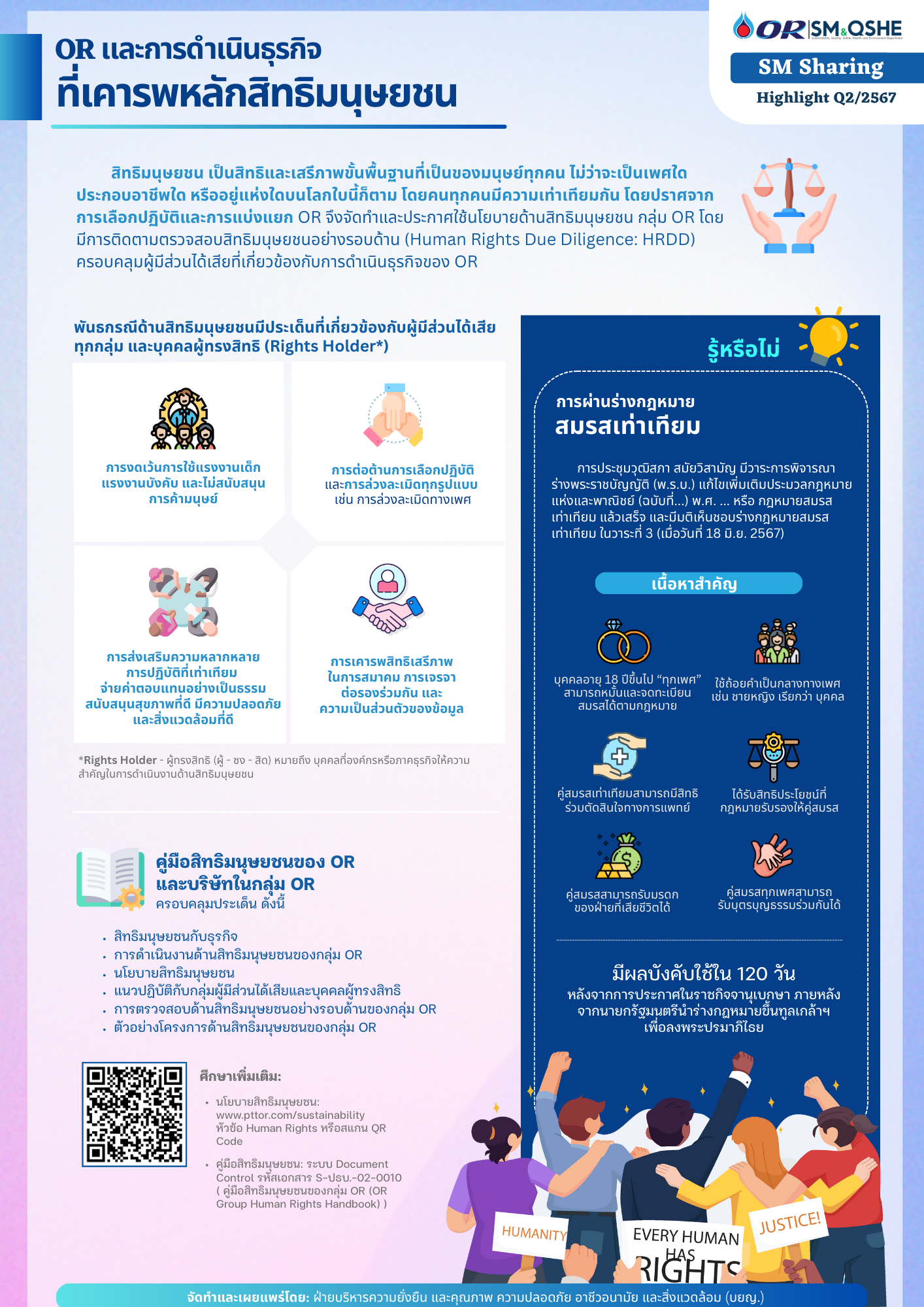
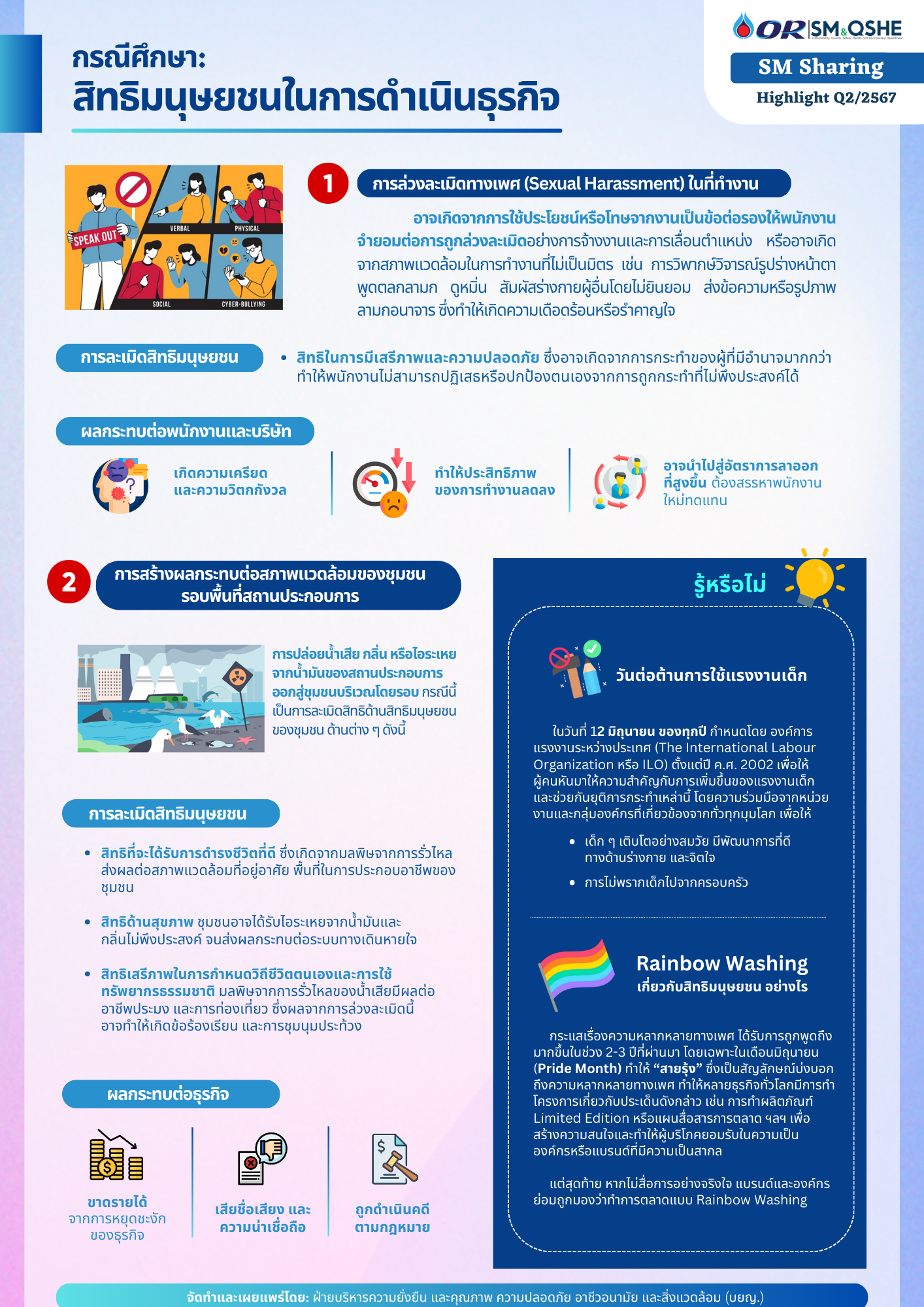
PR materials for educating about conducting business with respect for human rights
2) Human Rights Training
Human Rights Training and Informing
In 2024, OR conducted training and communicated information related to human rights to promote understanding and enhance employees’ capacity to comply with the company’s human rights policy. OR developed and distributed an online e-learning course, “Human Rights for OR Business” covering topics such as the fundamental principles of human rights in business, OR’s human rights policy, human rights risks in business operations, relevant human rights case studies in business, the human rights complaints process for OR employees and external individuals, as well as the organization’s practices for preventing human rights violations. In 2024 employees completed the training for 90.13% of the total employees. Additionally, OR also provided basic human rights and business principles training to the OR group in the country.
Discrimination and Harassment Training
As the “Discrimination and Harassment” is one of the salient human rights issues, OR has developed an online e-learning course on discrimination and harassment in which employees are required to complete training. The training course aims to provide participants with knowledge and understanding of key principles of equality, discrimination, harassment, bullying in the workplace, and relevant Thai laws. Additionally, the course covers preventive measures and guidelines for addressing issues related to discrimination, harassment, or intimidation in the workplace. A total of 85.47% of total employees participated in and passed the training.
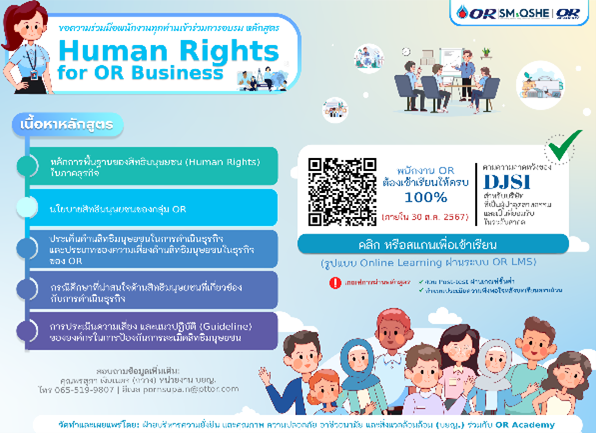
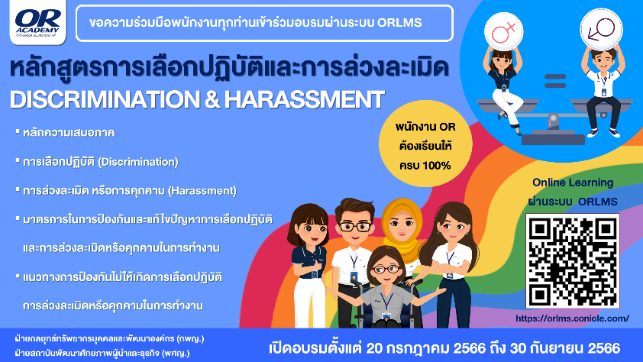
Training on Respect for Human Rights in Security Operations (GRI 410-1)
Contractors providing security personnel at OR’s operational sites must receive communication regarding OR’s Human Rights Policy. Furthermore, it is specified in the contract that they must undergo training on human rights, with 100% of security personnel and subcontracted security personnel acknowledging OR’s Human Rights Policy. Additionally, OR communicates the human rights specifications to its suppliers and ensures that they acknowledge and sign the OR Suppliers Sustainable Code of Conduct (SSCoC).
3) Human Rights Awards
OR participated in the 2024 Human Rights Model Organization competition, organized by the Rights and Liberties Protection Department, Ministry of Justice, for the first time in the state enterprise category. OR received an evaluation rating of ‘Excellent’ and took part in a panel discussion to exchange experiences on business practices that support human rights, with the topic ‘Best Practices from Award-Winning Human Rights Model Organizations of 2024.’ This emphasized OR’s commitment to conducting business with respect for human rights, transparency, accountability, and promoting income generation and social opportunities for OR’s stakeholders in a tangible manner.
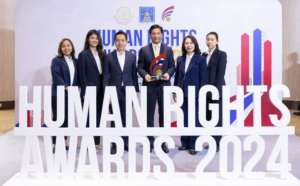
Related Documents
Site map
- About
- Organization
- Career
- Oil Business
- - Retail Energy Solution
- - Commercial Business
- Retail Business
- Services
- International Business
- Business Opportunity
- Sustainability
PTT Oil and Retail Business Public Company Limited
555/2 Energy Complex Building B, 12th Floor, Vibhavadi Rangsit Rd., Chatuchak, Bangkok 10900
© 2024 OR Tel : 02 196 5959


